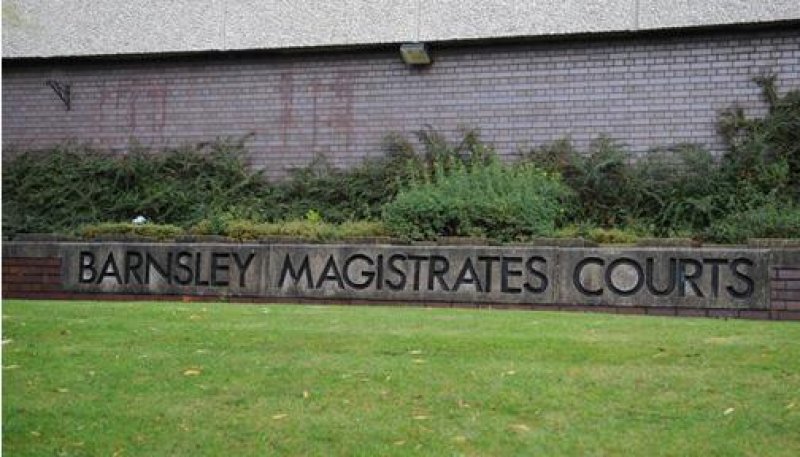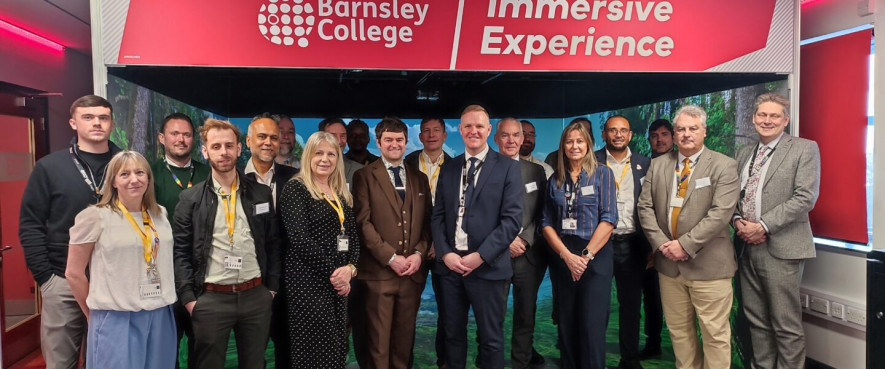BARNSLEY College has unveiled a state-of-the-art immersive space that can instantly transport students to extraordinary environments – from a football stadium or construction site to the depths of outer space or even inside the human body.
This groundbreaking technology is set to revolutionise the classroom experience, offering students and employers hands-on, interactive learning like never before.
Operating similarly to virtual reality, but without the need for any additional apparatus such as headsets, the Igloo Vision immersive space uses bespoke software and technology to create a flexible, interactive environment around users.
Barnsley’s immersive space is one of six interconnected facilities across educational institutions in the region.
The space, housed in the College’s Sci-Tech campus, provides a particularly accessible and engaging means of delivering presentations, creative sessions and lessons – transforming the learning experience across departments from digital and Esports, to healthcare, construction and engineering.
It also means a whole host of high-quality training options can be delivered directly to learners in the region, without the need to travel to other locations and facilities such as healthcare settings or building sites – improving sustainability, efficiency and consistency.
David Akeroyd, Barnsley College Principal and Chief Executive Officer, said: “This new immersive space is a game-changer for education, transforming the way our students learn by placing them at the heart of dynamic, interactive environments.
“At Barnsley College, we are dedicated to providing our students with all the tools they need to become exceptional – staying at the cutting-edge of new technologies is vital to that. It ensures that the skills and knowledge students leave College with are directly relevant to the world they will find themselves living, learning and working in.
“We are always looking to enhance engagement and accessibility for all students across any subject and discipline, and this immersive space truly does that – ensuring Barnsley College remains at the forefront of digital skills training.”
The launch marks the culmination of the college’s involvement in the Local Skills Improvement Fund (LSIF), which has seen a £4.2m investment in local skills infrastructure.
Dan Fell, Chief Executive Officer of Doncaster Chamber of Commerce, said: “Doncaster Chamber – supported by neighbouring Chambers of Commerce and other business organisations – led South Yorkshire’s Local Skills Improvement Plan.
“As part of that process, the Chamber network engaged with thousands of South Yorkshire businesses. Those businesses were clear that digital skills were of paramount importance to them as were modern methods of learning and an agile skills system. The immersive learning network ticks all three of those boxes and shows the willingness and ability of the region’s further education sector to respond to the needs of the region’s employers.
“These are challenging times for business with increased staffing costs just around the corner. However, smart business knows that continuing to invest in staff and workforce development is key to success. This innovation provides yet another reason for employers to partner with our region’s increasingly progressive and tooled up further education sector and to continue supporting the next generation of talent.”
Barnsley College led the bid, endorsed by Doncaster Chamber of Commerce – and supported by Sheffield College, RNN Group, DN Colleges Group, Northern College, Sheffield Hallam University, Communication Specialist College Doncaster, South Yorkshire Provider Network and the University of Sheffield AMRC Training Centre – which has raised the bar for digital skills training.
As part of the LSIF, the College also opened the UK’s first dedicated modern methods of construction training facility alongside Laing O’Rourke and T3 Training and Development.
The funding, from the Department for Education, provides the resource to realise the Local Skills Improvement Plan (LSIP) – a roadmap created with input from local education institutions and businesses to target the skills needs of the future.


















